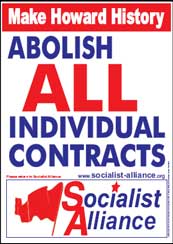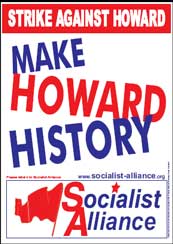

The following are comments by Socialist Alliance trade union activists on some of the key questions facing the union movement.
How can we limit the damage from Howard’s IR laws?
Tim Gooden, secretary, Geelong Trades Hall Council:
By resisting the bosses’ attacks every day up until the next
election - and beyond. Community picket lines against any firm that tries to enforce Work Choices will warn the bosses off and keep up our strength.
By actually organising, solidarity community-union groups in Victoria, WA, NSW and the ACT are defeating anti-union laws when the bosses try to use them.
Community picket lines have already won at Alcoa (Pinjarra, WA), Thompson’s Roller Shutters (Sydney) and Finlay Engineering, Toyota, Amcor, Hawker de Havilland and Tronics (Melbourne).
Seafarers on the MV Stolt also defied the law, occupied their ship and saved their jobs.
Community pickets and protests are also the best “election campaign” we can run against Howard. They keep IR in the spotlight and the government on the back foot - more than the ALP-ACTU’s marginal seats campaign can do by itself.
It wasn’t until the union movement started organising mass protests that Howard’s rating dropped in the polls. Our movement has the power to make Howard history!
We need more national protests combined with industrial action - to keep the sending the message that the movement to defend our rights at work isn’t going away.
Beazley promises to rip up Work Choices. What replaces it?
Mary Merkenich, branch councillor, Australian Education Union, Victoria:
Workers’ rights are human rights. So why not rip up all the anti-worker laws? We’re all sweating to throw Howard out, but if Labor wins will it do enough? There is a whole raft of anti-worker laws that the ALP hasn’t even talked about. So let’s hear Beazley and the state Labor
premiers commit to:
•Repeal the anti-union building industry laws and abolish the Australian Building and Construction Commission;
•Abolish the right of the Office of Workplace Services to take legal action and of the ACCC to use its anti-monopoly power on unions;
•Abolish the 1996 Workplace Relations Act and sections 45 D and E of the Trade Practices Act that ban secondary boycotts, ban the use of essential services legislation against unions, and repeal the anti-terrorism laws that can be used against unions for speaking and acting “seditiously”;
•Repeal the welfare-to-work laws that force people on benefits to accept any job, at below-award pay and conditions.
How do we make Labor keep its promises?
Susan Price, University of NSW branch president, National Tertiary Education Union:
Who can forget that it was the Hawke-Keating government that introduced enterprise bargaining, starting the rot that led to Work Choices?
Of course, a Labor government is preferable to Howard. But even if the ALP wins we’ll need to pressure it all the way. That’s even more true because the ALP is currying favour with big business by as good as promising it a seat at Labor’s cabinet table.
Beazley didn’t promise to rip up Work Choices until the second national union protest. He didn’t promise to abolish AWAs until the third national union protest. Even then Labor promised Rio Tinto that it could keep common law individual agreements.
The best ways to get Labor to stick to its promises are to:
•Get active in the union-community solidarity movement by taking part in picket lines and protests;
•Take part in our unions and make sure they keep up the pressure on Labor as well as the Liberals to repeal all anti-worker laws;
•Vote Socialist Alliance at the next election. The bigger our vote, the clearer the message to the ALP that it ignores working people at its peril.
How can we stop bosses breaking down conditions by bringing workers from overseas?
Raul Bassi, NSW Transport Workers Union delegate:
The bosses have always tried to use un-unionised workers from “out of town” to break down wages, conditions and union organisation.
The importing of workers on 457 visas is just more of the same.
These workers are employed in bad conditions and on miserable wages. If they complain or join a union it’s the next flight out.
The answer is clear - bosses need to be forced to provide industry-standard pay, and full award conditions and full citizenship rights for these workers.
We must fight for their rights just as we do for everyone’s.
Whenever Howard and the bosses know their policies are unpopular they whip up the media to distract and divide us by demonising people over their religion, race, nationality or gender.
The bosses want workers to fight among themselves while they get away with blue murder. Discrimination and prejudice are their weapons.
Whatever our differences, workers need to stick together.
What do we do if Labor loses? What’s ‘plan B’?
Jamie Doughney, Victorian division president, National Tertiary Education Union:
There’s an argument doing the rounds of the union movement at the moment: “If the ALP loses the next election we’re all fucked.”
If this idea takes off, it could turn into a self-fulfilling prophecy by convincing workers to give up the struggle in the event of a Coalition victory.
The Australian union movement has defeated much worse attacks than this. Unionists have been jailed and unions reduced to nothing - only to rise again because of the courage of working people.
In France this year, a massive campaign of strikes and protests killed off the government’s anti-worker laws - in a country with a lower level of unionisation than here!
Whichever party wins the election, the union movement must keep campaigning for the repeal of all anti-union laws.
The movement should be going on the front foot and organising a nationwide mass protest and stoppage for straight after the election.
That way Howard and the bosses will get the message that we will never give up until Work Choices is scrapped. And we will put Labor on notice to keep its promises.
[This is an abridged version of the Socialist Alliance leaflet prepared for the November 30 national day of action against Work Choices. Socialist Alliance members with official union positions speak in a personal capacity. Visit .]
From: Comment & Analysis, Green Left Weekly issue #692 29 November 2006.
November 30 is a truly national day of protest, with more than 300 rally points across metropolitan and rural Australia. Regional Victorian workers are being encouraged to come to Melbourne on November 29 to be ready for an early start the next day at the Melbourne Cricket Ground, or the “G”.
Tim Gooden, secretary of Geelong Trades Hall, told Green Left Weekly that, “It’s important there’s a massive turnout from all unions, workers and community groups because that’s the way to get the message across that we don’t accept Howard’s anti-worker laws.”
The October 25 Australian Financial Review reported that ACTU president Sharan Burrow had told the 500 delegates at the ACTU congress the day before that, “November 30 would be a case of everybody out”. She didn’t mention “strike” or “stop work”, but it was clear what she intended. Burrow also told the congress that besides the skeleton crews needed for the elderly and sick, everyone else should attend the nationwide protest.
As employers begin testing out Howard’s anti-worker laws, disputes have flared at Amcor, Heineman Electric, Boeing, Toyota, CSR, Finlay Engineering, Tronics and Port Campbell Gasworks in Victoria, and Alcoa in Pinjarra, Western Australia.
It wasn’t until after the huge turn-outs at last year’s November 15 national rallies that Kim Beazley committed a Labor government to “ripping up” Work Choices.
Gooden said that’s the other reason workers and the community need to mobilise in great numbers on November 30 — to keep the pressure up on Labor to follow through on its promises. “As we’ve seen many times before, Labor will have to be pushed to stick by its word. We don’t just want Work Choices repealed, we want all the other anti-worker laws scrapped as well.”
Many have said, correctly, that these laws are an attack on human rights, that is the rights of workers to join together in unions and organise to defend our class interests. This is also why blue- and white-collar workers have to work together in this campaign. Susan Price, National Tertiary Education Union UNSW branch president, told GLW, “In the past, a lot of white-collar workers associated industrial struggle with blue-collar workers. But now the NTEU is being targeted along with the Construction, Forestry, Mining and Energy Union because of the gains it made under enterprise bargaining.”
Amelia Taylor from the United Casual Workers Alliance on the Gold Coast told GLW that the November 30 protest “should be so large no one will be able to buy a cup of coffee afterwards, because all the cafes and shops, even the little ones, will have shut down for the rally”.
Taylor said that more than 70% of Gold Coast workers are casual, with no bargaining power. Irregular rostering has a negative effect on family life. Some casual workers are made to pay for their own uniform, docked from their first pay packet. Given that these workers are generally young and on youth wages, this often means that their entire first weeks’ pay is consumed.
The Coalition government has also passed pernicious laws dealing with the building industry. Workers who take “illegal” industrial action risk fines of up to $28,600. Workers who don’t answer questions, fail to turn up to an interrogation, or reveal the contents of an interrogation by the Australian Building and Construction Commission face an automatic six months’ jail term.
Other anti-worker laws that work hand-in-glove with Work Choices include: the “welfare to work” law, the “anti-terror” laws that compromise freedom of speech and assembly, and the laws that allow bosses to employ guest workers on section 457 visas on below-standard wages and working conditions.
Price said that some of the most exploited workers in Australia now are refugees on temporary protection visas and guest workers. “Recently, the CFMEU organised for some Indian and Korean guest workers to address a public meeting. These workers are experiencing the most gross exploitation from bosses in the construction industry. They ended their speeches with the call for workers of the world to unite. November 30 should also be about fighting for the rights of these workers.”
The scale of the attacks haven’t been seen in more than 100 years, Western Australian Maritime Union of Australia assistant secretary Ian Bray told GLW. “We’ve got to show that we’re not just worried about the laws for ourselves, we’re worried about their impact on our kids.”
According to Gooden, the other reason why a massive turn out on November 30 is important is because “it gives workers the confidence that they can defy Howard’s laws … There is nothing the government can do because it can’t fine or jail everybody”. Bray agreed, concluding: “We’re in for the fight of our working lives. A big mobilisation on November 30 will demonstrate that workers are angry, and will fight until these laws are abolished.”
[By Troy McGuinness, a former postal worker, was one of hundreds victimised by Australia Post for participating in previous national union protests against Work Choices.]
From: Green Left Weekly issue #689 November 8, 2006.






No comments:
Post a Comment